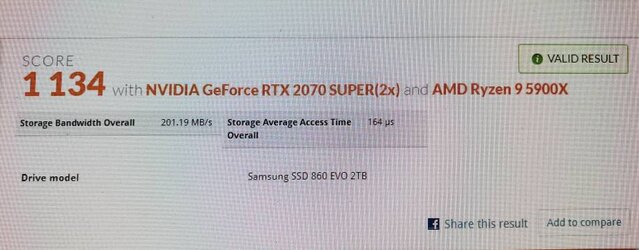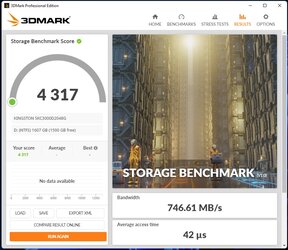First a copy/paste where I put my thoughts on this elsewhere:
In concept it isn't bad. They took traces of accesses for several gaming scenarios to recreate on the test system. Apparently it needs a 30GB test file to work off, so it does kinda represent a porky game install. The headline output is a benchmark score, with detailed output of average transfer rate and access latency.
I'd be curious to see how it performs if it wasn't for one hurdle. This is a paid DLC to the paid 3DMark Advanced, which is probably the version enthusiasts most likely have as it is frequently on sale. While the cost is not huge, the main question is what value does it give? If you have the hardware already, you get a score and... then what? Unlike CPUs and GPUs, there's not really much you can do to overclock or otherwise improve performance of a SSD. Maybe if you're testing software caching strategies? That's a bit of a stretch. Or just checking system performance, but there are other ways to do that.
Also the headline score is an abstract value, and only useful if viewed in context of others. I also have to wonder, how the tests are weighted. For example, one is for recording gameplay via OBS. I do wonder if they would have been better to split scores into several sections, for example, loading time (probably most important generally), install time (mix of read/write and/or copy operations?), and game video capture as another output.
Benchmark wise, how much does it vary with the SSD itself, or does it get impacted by the rest of the system? If you use it to decide what to buy, then the reviewer will buy and use it.
I think this opens more questions than it answers. Think I'll stick to CrystalDiskMark as at least it is clear what the outputs are of that.
Some additional thoughts since then:
I have since looked at the technical description given for the bench, which partially answers the "what" but is still unconvincing in its relevancy.
I have seen some others have run it and report not a lot of disk activity going on, and getting low average transfer rates. Far lower than what the drives are capable of. This might be realistic in the sense that games may still be coded in a way that benefits HD owners, at the cost of SSD owners. I don't know how true that is today. For a slow storage device, CPU performance impact cost is lower than storage performance impact cost. For faster storage like a SSD, the CPU quickly becomes the limiting factor. The traces that were taken and used in the bench would probably have such limitations baked in. Then it is no longer that much of a SSD test. Well, a fast SSD might still perform better than a slower SSD or even HD, but we kinda already know that already. Does this bench rank SSDs in a gaming usage case better than other test tools?
I think that it isn't free to the masses will kill it off from much usage.


